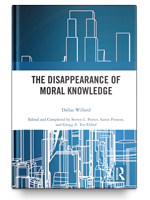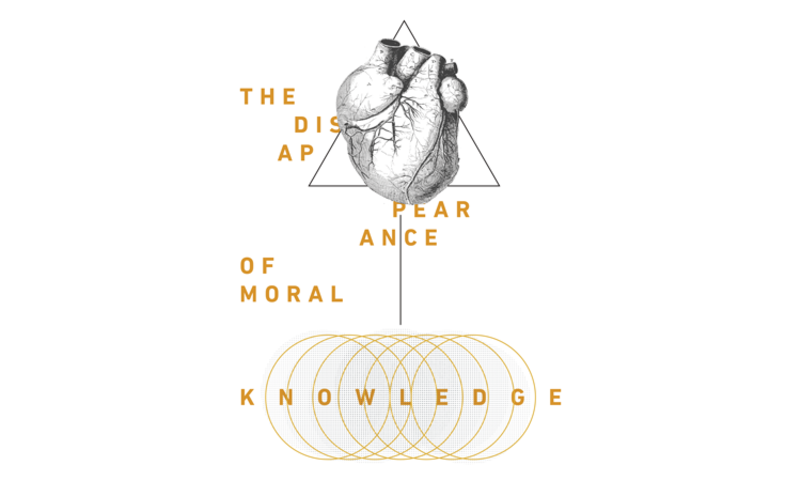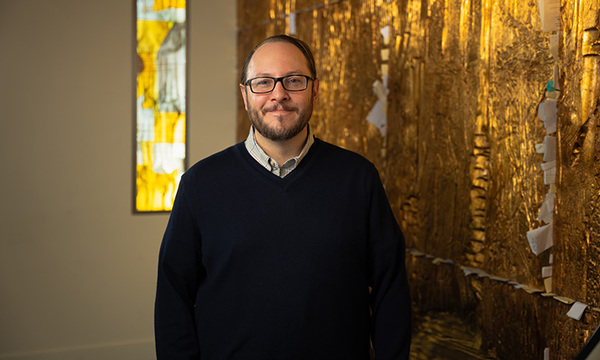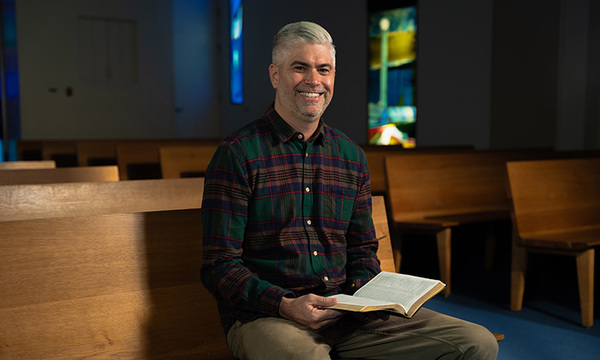Perhaps it goes without saying that we live in a time of moral bewilderment. Similar to the time of Isaiah, persons can easily call evil good and good evil (Isa. 5:20). Indeed, part of the moral perplexity of our times is that there are persons on opposite sides of a variety of social issues who would agree with that analysis. What one side believes to be “good,” the other side calls “evil,” and vice versa. This is truly a morally bewildering time.
In his 2018 posthumous publication, The Disappearance of Moral Knowledge (Routledge Press, June 2018), Dallas Willard puts forward an explanation and points toward a way out of this cultural situation. Of course, Dallas was a close friend, teacher and mentor of many at Talbot and Biola. If you had the opportunity to be around Dallas in the decade or so before his passing, there is a good chance you heard him speak of a book project he was eager to finish — The Disappearance of Moral Knowledge (hereafter, DMK). The seed for this book was planted in a talk Dallas gave at Biola in 1998 entitled “The Redemption of Reason.”
It is important to make clear that DMK is written to academics, particularly ethical theorists and historians of ethics. It is not a book on spiritual formation, neither is it specifically addressed nor particularly relevant to Christians. Nevertheless, the general thesis of the book has interesting implications for how we might think about the various breakdowns of moral discourse in our contemporary culture as well as how we might teach morality in light of the disappearance. To that end, I will provide a brief overview of what Dallas means by the disappearance of moral knowledge, a couple of his suggestions for rehabilitating moral knowledge, and close by developing three implications for Christian moral instruction.
What is the disappearance of moral knowledge?
First, it will be helpful to get clear on what the disappearance of moral knowledge is not. Dallas did not think that moral knowledge does not exist, nor did he think it was unattainable. In fact, the largest portion of his book (chapters 2–7) seeks to show that no successful arguments were made within 20th century ethical theory for either of those ideas. Moreover, the disappearance of moral knowledge has very little to do with whether or not persons in Western culture have less moral knowledge than they did prior to the disappearance. What has disappeared, according to Dallas, is the public availability of moral knowledge as a reliable resource for human living. In other words, the authoritative institutions of our culture — primarily, the university but also the church, education and government — no longer present moral knowledge as the way things actually are grounded on an appropriate basis of evidence.
“The institutions of knowledge in contemporary Western society do not possess a recognized body of moral knowledge, and hence do not make it available as such to the individuals and groups they serve,” Dallas writes. “... This is not a situation that a thoughtful person can easily accept or be happy about. Is it really true that what many take to be the most important aspect of human existence, the moral, must be lived blindly, driven only by instinct, feeling, uncertified opinion, tradition, or one or another type of force?” (p. 44).
As an illustration of the disappearance of moral knowledge, Dallas would note that if a university professor marked a student down on an ethics exam for claiming that racist attitudes, for instance, were morally praiseworthy, that student could appeal the professor’s grade and would eventually prevail. Unlike institutionally recognized domains of knowledge — such as mathematics and history — in which students can be graded down for incorrect answers, ethics is not recognized in the university setting as dealing with a publicly available domain of knowledge by means of which a student’s perspective on morality can be objectively evaluated. While there are, of course, many persons and institutions that make moral claims about which behaviors are acceptable and which are not, Dallas held that as a social fact we do not present those claims as knowledge: that is, as the way things are on an appropriate basis of thought processes and experience, open and accessible to anyone (see p. 344).
This shift in the overall cultural attitude towards moral knowledge is devastating for both individuals and society as a whole. To fail to recognize that, for instance, “lying is wrong” is how things are and can be based on appropriate evidence and instead come to treat it as mere feeling, or tradition, or uncertified opinion is to undermine the way that good and bad, right and wrong are meant to function in human life. Without a vision of the good life as truly good, human desire is left to want what it wants without the constraint of knowing what is good, better and best. Knowledge of good and bad, right and wrong recognized as knowledge (and not, for instance, as mere feeling) provides authoritative guidance for living. Dallas held that the authority of such guidance degenerates and, in fact, disappears when the authoritative institutions of Western culture cease presenting moral knowledge as publicly certifiable.
Dallas thought it was important to understand how this vast shift in cultural attitude occurred.
“It is important, in coming to grips with the exact nature of the shift to our present position on moral knowledge, that we consider the manner in which that shift came about,” he writes. “In so doing we will get a better idea of what it does and does not mean, and especially of what it means for the present and future of moral understanding — for the prospects of moral knowledge” (pp. 5–6).
While Dallas describes various factors involved in the shift (see pp. 8–18 and also chapter 3 of Knowing Christ Today), for the sake of space, I will mention the one most relevant for our purposes.
Without a vision of the good life as truly good, the human desire is left to want what it wants without the constraint of knowing what is good, better and best.
The first cause of the disappearance of moral knowledge that Dallas puts forward is the discrediting of religion, and particularly the Christian church, as a reliable source of moral knowledge (pp. 8–9; see also, Knowing Christ Today, pp. 74–75). According to Dallas, this discrediting happened in at least two ways. First, due to the “many-layered tie of the moral life to the Christian religion,” it was mistakenly thought that moral knowledge was dependent on the existence and knowledge of God (p. 8).
“As the assumption that there is no knowledge of God ... strengthened in the literature and public institutions of Europe and North America, the assumption that there is publicly available moral knowledge correspondingly weakened. And as religion itself eventually came to be relocated from the domain of knowledge to that of ‘faith,’ morality was assumed to follow” (p. 8).
Second, Dallas observes that the Christian church failed to apply the moral teachings of Jesus to the “appalling conditions of European humanity during the 1700s and 1800s. ... If the church was the voice of Jesus to humankind, then he certainly appeared to have much to say that was terribly wrong and that sided with the ruling classes in horrible abuses of their power” (Knowing Christ Today, p. 74).
The result of this discrediting of Christianity was not, at first, the abandonment of the moral teachings of the Judeo-Christian tradition, but rather the attempt to reestablish those teachings on a secular, “scientific” basis. But, as Dallas argues in DMK, this project to refound moral knowledge on a secular basis failed. Dallas writes, “The failure at the intellectual level to find a secular, non-Christian basis in accepted knowledge for the values and principles of Christian morality — specifically, the central teachings of Jesus — took quite a long while to undermine the general confidence of the universities, and then of the churches, divinity schools, and seminaries, in the status of Christian ethics as knowledge of moral reality” (Knowing Christ Today, p. 75).
This declining confidence along with other cultural and historical influences, led to the social relocation of moral discourse and teaching outside the domain of what is real and can be grounded in evidence. Once morality was no longer widely recognized as that sort of enterprise, it was left to be thought of as mere “tradition,” feeling, opinion, or “faith.” But, again, such a view of morality is not action-guiding and it fails to provide an authoritative basis upon which morality can be commended to others. The result is that Western society was set morally adrift.
Prospects for Reclaiming Moral Knowledge
If Dallas’ view is an accurate diagnosis, at least in part, of what ails contemporary society when it comes to our moral bewilderment, then what can be done? In the final chapter of DMK, Dallas addresses “the prospects for the rehabilitation of moral knowledge as a public and private resource for the guidance of life” (p. 44). While there is much more to say about those prospects, two of Dallas’ most salient points follow.
First, Dallas thinks it is very important to understand that moral knowledge disappeared from Western culture due to various causes (the shift already referred to) and not because it was discovered by “the experts” that moral knowledge did not exist or could not be attained. This puts one in a position to assess how one might have been influenced in his or her own attitude towards moral knowledge by those shifts, which might allow a fresh hearing for the possibility and attainability of moral knowledge.
Second, Dallas maintains that one overarching problem with moral theorizing is the failure “to identify one subject as the subject of moral theory” and to remain focused on it as a stable subject matter (p. 352). Dallas has us wonder along with him how human progress in ethical understanding could be made with a frequently changing object of study — the good life, the good society, the soul, dispositions, obligation, consequence, law, emotion, etc. — such as we see in the history of ethical theory. In place of this moving target, Dallas suggests identifying a good person as the central subject of moral theory. This is, in part, a methodological point for ethical theorizing: start by careful examination of clear cases of good persons and seek to describe what it is that makes such persons good.
Of course, as Christians, we cannot help but think of Jesus when we think of examining the good person as the fundamental object of moral analysis. While Dallas did not bring up Jesus in DMK and while his methodology is meant to be applied to a wide range of moral exemplars, Dallas argued in Knowing Christ Today (pp. 51–54) that Jesus lived out and taught the best answers to the fundamental questions of human existence: what is real? (God and his kingdom), who is really well-off? (those alive in the kingdom of God), who is a truly good person? (anyone pervaded by love), and how does one become a good person? (one entrusts one’s self to Jesus as his apprentice in kingdom living). Thus, for the Christian, examining clear cases of good persons can be fruitfully integrated with a careful examination of the person of Jesus and his overall way of life.
Christian Moral Instruction In Light of the Disappearance
Again, Dallas’ primary purpose in writing DMK was to help academics within the university. The university, and particularly, “research” universities, are the institutions with the greatest epistemic authority in our culture today. Universities have, to use James Davison Hunter’s language, significant “symbolic capital” (Hunter, To Change the World, pp. 35–37) and thereby substantial cultural influence. It is consistent with Dallas’ overall thesis that we should not expect much change when it comes to the disappearance of moral knowledge until the university begins again to present moral knowledge as knowledge.
Nonetheless, there are implications of Dallas’ thesis for Christians who are not involved in the university. For one, it is important to note that for many centuries, Jesus’ core ethical teachings, with various additions and refinements along the way, were the accepted moral framework for the Western world and that the church was the primary social institution that preserved, refined and transmitted that knowledge to broader society. If the church played such a central role in the past — and certainly no one would have expected it would do so at the end of the second century — it might do so again, even if the current prospects look dim.
In this regard, another instructive point is that one of the factors that led to the disappearance of moral knowledge was the discrediting of the institutional church as a reliable source of moral guidance and some of that discrediting had to do with the church’s failure to apply Jesus’ ethical teachings to social conditions within 18th and 19th century Europe. Just as Jesus announced the present availability of the kingdom of God, embodied life in that kingdom, and taught about how to make progress in kingdom living, so too Christians today must consistently announce, embody and teach others about life with Jesus in his Father’s kingdom. Which, no doubt, involves demonstrating love to those in need. The church’s only hope to regain its moral credibility, both among Christians and non-Christians, is to consistently show forth the goodness of the way of Jesus as we proclaim the goodness of Jesus himself.
Second, Dallas maintained that Christian schools, seminaries and churches lost confidence in recognizing moral knowledge as knowledge of how things actually are and as capable of being represented on an appropriate basis of evidence. In light of this lost confidence, Christians would do well to examine their own moral beliefs and become personally reacquainted with their grounds for holding those beliefs. It may be the case that many Christians hold their moral views more on the basis of feeling, or political affiliation or even “faith” (understood as something less than knowledge), rather than as well-grounded understanding of the truly best life possible.
The church's only hope to regain its moral credibility, both among Christians and non-Christians, is to consistently show forth the goodness of the way of Jesus as we proclaim the goodness of Jesus himself.
Moreover, many moral issues in our day are complex, and to reacquaint one’s self with the arguments both for and against various moral positions as well as the relevant moral distinctions might very well engender not only a renewed confidence but also a renewed intellectual humility regarding one’s moral beliefs. Dallas writes in Knowing Christ Today, “Only upon a solid basis of knowledge can spokespeople for Christ have the confidence in what they are saying and doing that allows them to be calm, clear, and courageous facing today’s world. It enables them to stand firmly and lovingly in the midst of the constant cultural yammering over who has knowledge and who is right. It is not knowledge, but nervous uncertainty, that makes people dogmatic, close-minded, and hostile — which spokespeople for Christ must never be” (p. 201).
Third, in teaching Christian morality in the church, we need to make sure we are teaching morality as the best information available for living human life well. The pursuit of moral truth and a moral life should not be motivated out of avoiding shame and guilt or trying to impress God and others with our being “right.” The primary goal of moral teaching in the church is to learn alongside our Master Jesus what is involved in being conformed to his image (Rom. 8:29). Dallas writes that teaching moral knowledge to others “certainly requires an inward and uncoerced activity of exploration and comprehension for its realization ... in a way that respects and elicits the full and free engagement of the students’ intellectual faculties to arrive at an understanding and knowledge of moral phenomena, and of the moral life, that is their own. ... Our task as teachers is not to control behavior or belief, but to help students achieve understanding” (pp. 36, 38). This is an important insight on the nature of belief formation that must be applied in our Christian educational settings.
Conclusion

At the time of Dallas’ passing, DMK was left unfinished. It was my great privilege along with two others (Gregg A. Ten Elshof (M.A. ’96, professor of philosophy) and Aaron Preston) to complete Dallas’ manuscript (our explanation for how we did so can be found in our editorial introduction to the book). By far the most enjoyable aspect of working on Dallas’ book was being reminded, through his words, of Dallas himself. There is no one I have known who could write about moral knowledge with more personal integrity and, thereby, experiential authority than Dallas Willard. It was not, mind you, that he was so incredibly perfect. Rather, it was that he seemed so incredibly loved. He not only saw moral knowledge as knowledge of how things actually are, but he saw spiritual knowledge as a real, interactive connection with his master, Jesus. While some of Dallas’ other books are given to that dimension of his life and teaching, DMK is certainly not wholly disconnected. One might expect that a disciple of Jesus would want others — both inside and outside the church — to regain their vision of the possibility and attainability of living a truly good life.
 Biola University
Biola University



